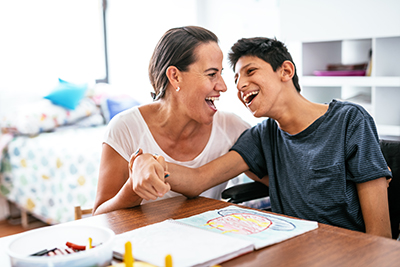Navigating Rights to Educational Services for Multilingual Students with Disabilities

School closures have left parents and guardians of multilingual children with disabilities with many questions. Although many schools have finished the school year, this article is intended to give parents and guardians an overview of their child’s rights to educational services for planning the next round of instruction.
This article references a U.S. Department of Education bulletin and resources from the National Center for Learning Disabilities (NCLD), and is not intended to be a legal interpretation of federal policy.
Question: Is a school district required to educate students with disabilities if school isn’t in session due to COVID-19?
Answer: If a school district is providing learning opportunities to its general population of students, it must ensure that students with disabilities have equal access to the same opportunities, including the right to a free and appropriate education (FAPE), according to guidance from the U.S. Department of Education in a March 20, 2020, bulletin. This bulletin summarizes information from the Individuals with Disabilities Education Act (IDEA), including Section 504 of the Rehabilitation Act of 1973 (Section 504), and a student’s Individualized Education Program (IEP).
The NCLD reminds us that schools and districts are working hard to identify how to support students until schools are back in session: “These include having a way to hold IEP and 504 meetings virtually, and ensuring that your child progresses in the core curriculum and receives needed accommodations to access information. Figuring this out will take time. Be a ready and willing partner with school staff in this process.”
Question: Can I expect my school district or school to provide the instructional program and related services identified in their IEP?
Answer: The U.S. Department of Education states that “school districts must ensure that, to the greatest extent possible, each student with a disability can be provided the special education and related services identified in the student’s IEP developed under IDEA, or a plan developed under Section 504.”
Children with disabilities often have services with multiple school staff members: reading specialists, speech-language therapists, instructional aides, counselors and case managers. Teachers and service providers may need to adjust their services and alter how they address your child’s needs. NCLD suggests looking at your child’s IEP or 504 plan to identify staff members providing services and encourages reaching out to them to ask about compensatory services to support your child – including plans for the short, medium and long-term – and how you might be able to support your child.
Question: What services am I entitled to request for my child during a district or school closure due to COVID-19?
Answer: Try to work with your local school district or school to develop a plan that works for your child, considering the constraints established by your state and locality in regards to social distancing. Something that would be helpful is to document the services your child received prior to the closure, services that have been offered during the school closure, your child’s progress and your child’s access to materials and education.
Question: Could an IEP team consider adding a distance learning plan to a child’s current IEP as a contingency plan, in case another COVID-19 outbreak closes the school?
Answer: Yes. IEP teams may, but are not required to, include distance learning plans in a child’s IEP. Such distance learning plans may include services at an alternate location or access to online or virtual instruction, instructional telephone calls, other curriculum-based instructional activities, and may also identify which special education and related services, if any, could be provided at the child’s home. Creating a contingency plan gives the child’s service providers and parents or guardians an opportunity to reach an agreement as to what circumstances would prompt the use of the child’s distance learning plan and the services that would be provided during the school closure.
Remember: this is a hard time for everyone. Be gentle with yourself, including expectations for both you and your child. The Child Mind Institute reminds us that being kind to ourselves helps us maintain balance and provides us with enough bandwidth to take care of our family, too.
Resources for more information*
National Center for Learning Disabilities
- COVID-19 resources for parents, educators and young adults
- Supporting Children with Disabilities in Virtual Learning (for educators)
- Supporting Children with Disabilities in Virtual Learning (for parents)
Center of Parent Attorneys and Advocates
U.S. Department of Education
The Child Mind Institute
*WIDA does not advocate for or endorse any of the suggested technologies for instruction. Schools, districts and states are responsible for making choices about appropriate and applicable technologies and products.
About the author
Maureen Purcell recently graduated with a Master of Public Affairs from the La Follette School of Public Affairs. This past year, she was a project assistant on the ALTELLA team. Previously, she worked as a teacher of multilingual students in Grades K-8 and as an Education Specialist at the Wisconsin Department of Public Instruction. Her heart will always be with middle school students and the teachers who love them.





